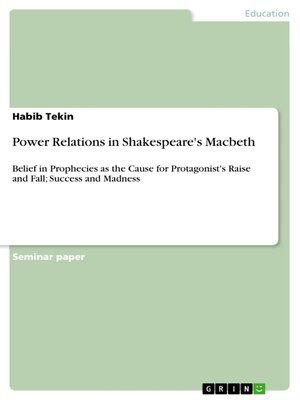Power Relations in Shakespeare's Macbeth
ebook ∣ Belief in Prophecies as the Cause for Protagonist's Raise and Fall; Success and Madness
By Habib Tekin

Sign up to save your library
With an OverDrive account, you can save your favorite libraries for at-a-glance information about availability. Find out more about OverDrive accounts.
Find this title in Libby, the library reading app by OverDrive.



Search for a digital library with this title
Title found at these libraries:
| Loading... |
Seminar paper from the year 2014 in the subject Didactics for the subject English - Literature, Works, grade: -, University of Mannheim, language: English, abstract: The following term paper is based on the Tragedy of Macbeth by William Shakespeare and examines the power relations in this masterpiece of work. The tragic flaw of the characters, in particular Macbeth's and Lady Macbeth's will be analysed, whether the belief in prophecies is, in deed, the cause for their fall or if there are any other argumentations that must be taken under consideration. Therefore, both protagonists, who are also husband and wife, will show us their own perspectives of their tragic flaw. This leads us to the fact that the main part of this term paper is divided into two parts that will demonstrate the different ways, - Macbeth and Lady Macbeth - of how to read the text in the end. Starting, in general, with power relations in the Elizabethan England, here, it is important to know that the main focus is upon female characters, because considering the most powerful personality in the country as being queen, Queen Elizabeth I.. Thus, one may see that power is not given only to men, but to women, as well. Afterwards, the main part with the Power of Doubleness proceeds. In the tragedy of Macbeth there are a lot characteristics of doubleness, which goes through the text; for example, the duplicitous nature of the characters, world of wishes versus world of conscience, sorrow and guilt versus despair, death scenes etc. Therefore, this strategy is also behold in this term paper and that is why we have got a separation of, firstly, Lady Macbeth with subheadings like Female Power, Mortal versus Magical Thoughts, Bloody Instructions and Lady Macbeth's Madness, and, secondly, Macbeth with its subheadings such as Role of the Witches, Fatal Vision, Banquo's Ghost, Fear and Ambition Ending in Madness. The term paper ends with a brief résumé that collects all the results.






